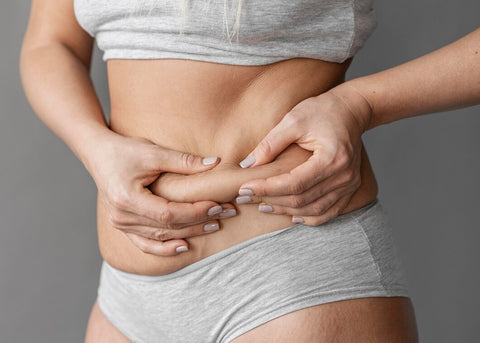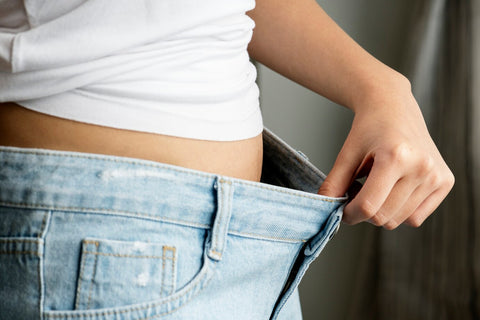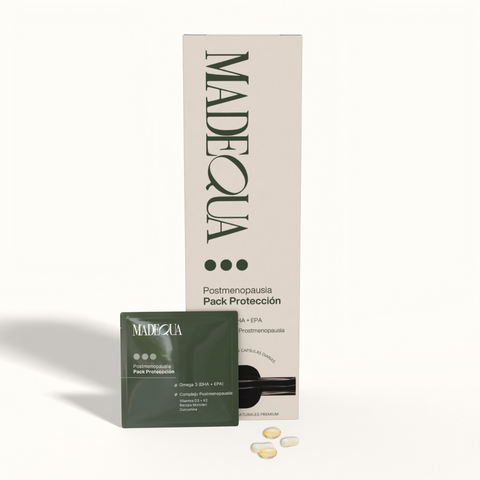Fluid retention during menopause is one of the most bothersome signs, along with hot flashes, chills, night sweats, sleep problems, mood swings, among others.
You may notice fluid retention in your wrists, ankles, abdomen and face. You may also feel like you have suddenly gained weight, and feel heavier and more tired.
The cause of this discomfort can be explained in part by the lack of control of female hormones, since during menopause the ovaries will stop producing hormones such as estrogen and progesterone, which have crucial effects on the regulation of body fluids.
Fluid and sodium regulation is controlled by a number of complex systems, all of which are influenced by estrogen and progesterone. With menopause, the decrease and cessation of estrogen and progesterone production causes this balance to be disrupted, which can lead to fluid retention, causing bloating.
Fluid retention during menopause is one of the most common problems. According to data from the Spanish Association for the Study of Menopause (AEEM), 75% of women aged 45 to 50 suffer discomfort during menopause.
You may feel bloated, notice that your clothes are getting tighter, have gained weight for no reason, or experience a constant feeling of heaviness. These problems, despite being very common in many women, affect our quality of life, so it is very important to follow healthy guidelines that help us during this stage.
What is fluid retention?
Fluid retention, or edema, is an increase in the volume of interstitial fluid, that is, an excessive accumulation of fluid in the tissues. We can feel it when the body or a part of it swells due to the excess fluid that is trapped.
It is important to drink water, drink diuretic teas, perform lymphatic drainage or do physical activity, because these guidelines may be enough to eliminate fluid retention. The use of diuretic medications can also help eliminate excess fluid from the body.
Specialists recommend walking, running, swimming or cycling to lose weight during menopause, a stage of hormonal changes and alterations in body shape. In addition, other aerobic exercises can be added to all these exercises to increase muscle mass and tone and flexibility, such as lifting weights or using elastic bands, under the supervision of a professional. Yoga, pilates or tai chi are also recommended.
The ankles and eyelids are typical areas where more fluid normally accumulates, resulting in local edema, where the skin appears stretched or shiny and if you press on it with your finger, it leaves a mark that will gradually disappear. As a general rule, the symptoms are more common in summer with high temperatures. However, it is also possible for a regional edema to form, that is, an edema in one extremity or affecting the entire body. The causes that usually cause this fluid retention are normally incorrect hydration, poor diet, spending many hours standing or sitting, diseases that derive from the heart and the taking of certain medications.
Tips to prevent fluid retention during menopause
It is not a serious symptom of menopause, but it is certainly annoying. Let's look at some guidelines to prevent fluid retention during this stage.
1. Nutrition is essential to deal with fluid retention; having a balanced diet, reducing salt consumption and increasing fluid intake is essential. To do this, we will have some foods that we can include in our diet such as:
- Cucumber, melon, celery and watermelon for their high water content.
- Tomatoes have a diuretic function because they contain vitamin E, vitamin C, folic acid, potassium, flavonoids and are rich in lycopene and beta-carotene.
- Artichokes are a rich source of fiber and potassium, and asparagus are a rich source of water and fiber. These two foods are crucial to prevent fluid retention.
- Cabbage also contains a large amount of water and is high in potassium, thus performing a diuretic function, necessary for this symptom of menopause.
- Eggplant is a good vegetable for fluid retention due to its low sodium levels.
- Lemon with water will be beneficial to help the kidneys work.
- It is preferable to eat foods with fiber to prevent constipation, such as cereals, legumes, vegetables, fruits and nuts. We should avoid foods high in sodium (salt), since it is one of the main promoters of fluid retention, and eliminate sausages, pickles, canned foods, flavor enhancers, sauces and precooked foods from our diet.
2. Physical exercise will be a key element in fluid retention. Staying active will be useful to avoid weight gain resulting from fluid retention during menopause, but also to promote sweating, resulting in the expulsion of said fluids.
3. Replace salt with herbs. Avoid adding salt to your meals, as salt "attracts" water, so the more salt you consume, the more water you retain. Instead, use herbs, spices, lemon, vinegar and oils flavoured with garlic, oregano or chilli to enhance the flavour of your meals. Also avoid salted fish such as anchovies, sardines, mackerel or herring, as well as salty pastries and snacks.
4. Water, water and more water. Although it may seem contradictory, to prevent fluid retention it is necessary to drink plenty of fluids. If you follow the recommended two litres of water, you will help expel the fluids that have been trapped in the tissues. You can also drink diuretic infusions.
5. Avoid very tight clothing, because it obstructs your circulation and makes it difficult to properly expel bodily fluids.
6. Get at least 8 hours of sleep. Getting plenty of rest prevents fluid retention.
7. One part of the body that tends to retain fluids and swell is the legs. To avoid this, you should try not to remain sitting, standing or in the same position for long periods of time, and try to keep your feet slightly elevated when you are resting. It is also a good idea to do exercises to improve blood circulation.
8. Limit alcohol consumption. Alcoholic beverages add more calories to your diet and increase the risk of weight gain. They also cause excessive water loss, since alcohol dehydrates and the body responds by retaining more water, increasing fluid retention.
Abdominal bloating
Abdominal bloating is a feeling of tightness and volume in the abdominal area that can cause discomfort or pain, and is very similar to that normally experienced during the days before menstruation.
As your hormone levels change, you may experience increased fluid retention, and this retention adds to the feeling of bloating in your belly, which may be accompanied by other digestive problems such as constipation or gas.
Salt consumption is the first thing you should reduce, since according to the World Health Organization (WHO) it is recommended to take a maximum of 5 grams per day and the average daily intake of people is currently between 9 and 12 grams. But it is not only what you eat that influences bloating, but also the way you do it. If you eat slowly and chew your food well, you will help your digestion to be easier. Remember also to eat moderate portions, since heavy meals can lead to gastrointestinal discomfort, in addition to avoiding carbonated drinks.
Conclusion
Taking a comprehensive approach that combines a healthy diet, regular exercise, effective stress management and the proper use of quality supplements can significantly help reduce fluid retention, boosting an anti-inflammatory and antioxidant state. Madequa's supplements specific to each of the stages of menopause are an excellent option, always combined with a healthy lifestyle, they will help you navigate this stage with confidence and well-being.
Therefore, if you still don't know what stage of menopause you are in, you can take our test, which will recommend the most suitable pack for your needs and personalized lifestyle guidelines. It is important to note that it is essential to consult with health professionals to personalize these strategies and thus address the individual needs of each woman.
References
Monteleone P, Mascagni G, Giannini A, Genazzani AR, Simoncini T. Symptoms of menopause - global prevalence, physiology and implications. Nat Rev Endocrinol. 2018;14(4):199-215. doi: 10.1038/nrendo.2017.180.
Davis SR, Pinkerton J, Santoro N, Simoncini T. Menopause-Biology, consequences, supportive care, and therapeutic options. Cell. 2023;186(19):4038-4058. doi: 10.1016/j.cell. 2023.08.016
Stachenfeld NS. Hormonal changes during menopause and the impact on fluid regulation. Reprod Sci. 2014;21(5):555-61. doi: 10.1177/1933719113518992.
Victoria State Government. Fluid retention (oedema). Better Health Channel. 2017.
Cecilia Montagna. Solves fluid retention. Spanish Heart Foundation. 2014.
Noelina R. All About Water Retention. MenopauseNow. 2019.
Garcia, I. Symptoms of menopause: bloating in the belly. Menopause Institute. 2020.
Ruiz, A. Menopause and fluid retention. Menopause Institute. 2020.
The reality of weight gain during menopause. Mayo Clinic. 2023.




Comments (0)
There are no comments for this article. Be the first one to leave a message!